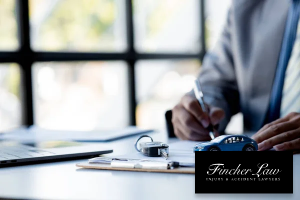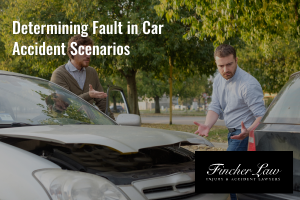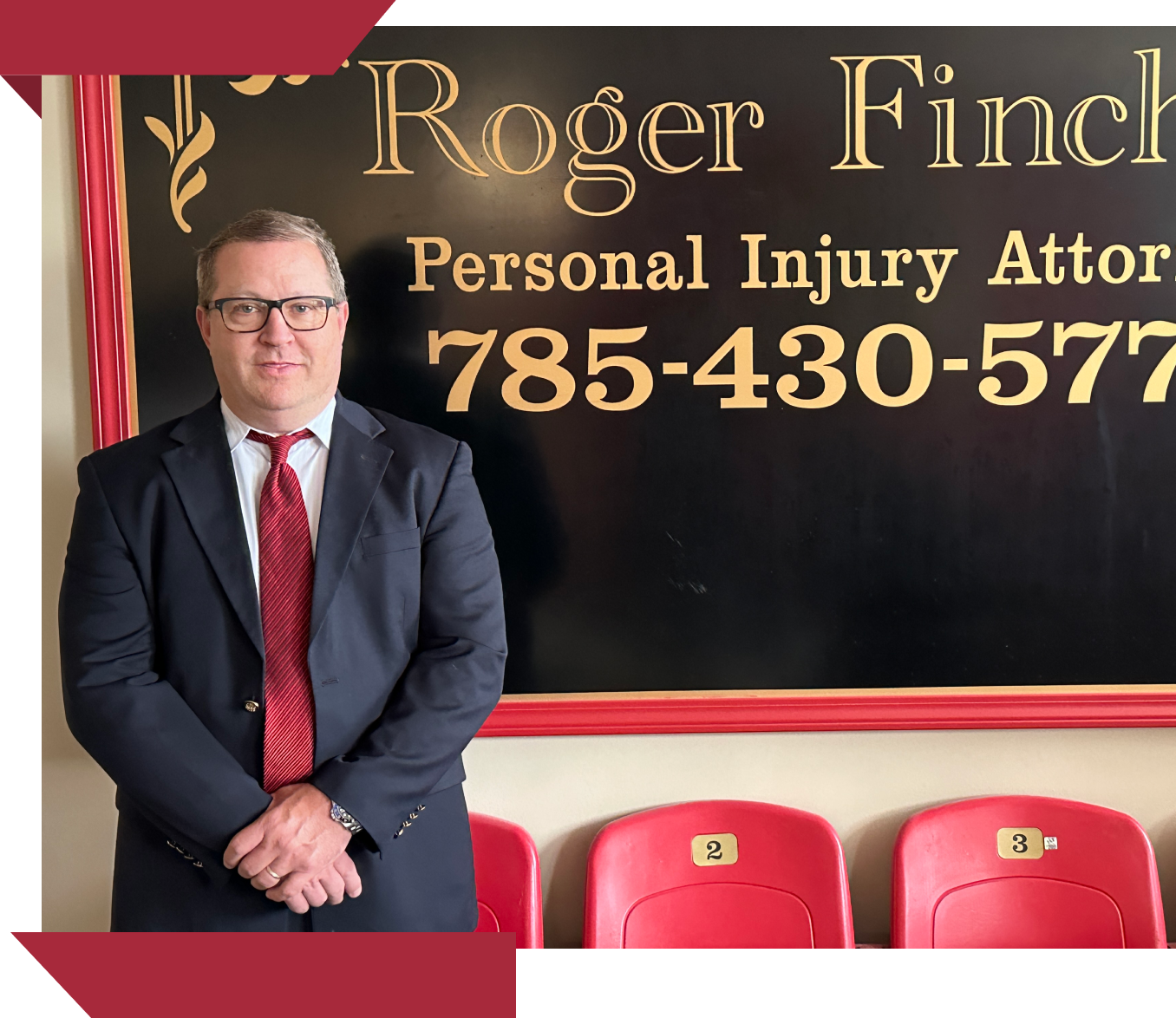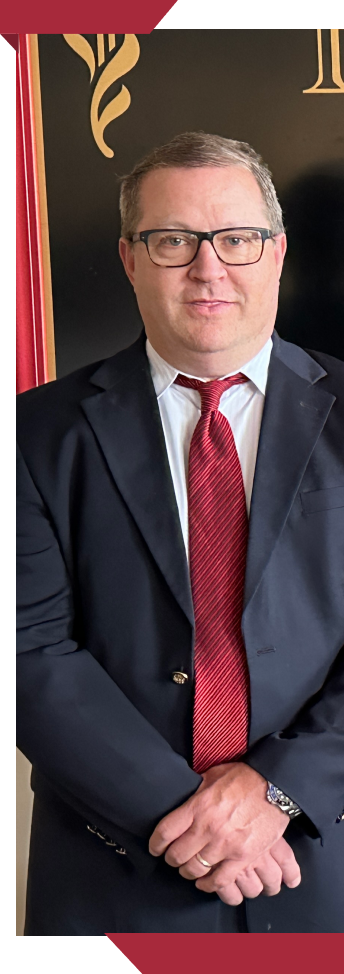
After a car accident, one of many people's first questions is about insurance: whose insurance will cover the damages? It's a crucial question that can significantly impact your financial situation. At Fincher Law Injury & Accident Lawyers, we understand how important it is to navigate these insurance matters correctly. We're here to provide clarity and guidance through the often-confusing world of car accident insurance claims.
So, when does your auto insurance policy or insurance coverage pay for the damage? When does the other driver's insurance company pay for the accident? Our personal injury lawyer is here to help you sort through your collision coverage as it pertains to your insurance provider. Contact us to schedule a free consultation.
In car accidents, the question of liability—who is at fault—plays a major role in determining whose insurance pays. Liability is often based on state laws and the specifics of each accident. In some states, the driver who caused the accident is responsible for the damages. In others, each driver's insurance covers their own damages, regardless of who is at fault.
Determining liability can get complicated, especially in accidents where fault isn't clear-cut. Insurers will review the accident details, police reports, and state laws to decide. It's important to know your state's laws on car accident liability. This knowledge can help you grasp what to expect from the insurance process.

Determining who is at fault in a car accident is crucial for insurance claims. Fault determination guides the insurers in deciding who pays for damages. The process involves looking at the accident details, driver statements, and sometimes, police reports. Understanding how the driver's fault is determined can help you in your insurance claim process.
In single-vehicle accidents, the driver is often presumed to be at fault. But there can be exceptions, like poor road conditions or vehicle malfunctions. If you're involved in a single-vehicle accident, document the scene thoroughly. This evidence can be crucial if you need to prove that factors beyond your control contributed to the accident.
External factors like wildlife, road debris, or weather conditions can sometimes cause these accidents. If this is the case, documenting these factors is key. Photos, weather reports, and witness statements can help demonstrate that you weren't solely at fault.
Multi-vehicle collisions can be complex when it comes to determining fault. Often, fault may be shared among several drivers. It's important to exchange information with all parties involved and gather as much evidence as possible. Your insurance company and possibly the court will use this information to determine the degree of fault for each driver.
In these scenarios, each driver's actions before the collision are scrutinized. Things like speeding, not following traffic signs, or distracted driving can affect fault determination. Always be truthful when giving your account of the accident. Your honesty can play a crucial role in the fault determination process.
Accidents with uninsured motorists can be challenging. If the at-fault driver doesn't have insurance, recovering damages can be difficult. Your insurance policy may have coverage for accidents with uninsured motorists. Review your policy to understand what protections you have in these situations.
If an uninsured driver collides with you, your own insurance may cover your damages, depending on your policy. This is where having uninsured motorist coverage is beneficial. If you don't have this coverage, you might have to pay out of pocket or seek legal action against the other driver.
Personal Injury Protection (PIP) and no-fault insurance play a significant role in car accident claims. In no-fault states, your own insurance pays for your damages, regardless of who caused the accident. PIP coverage can help pay for healthcare expenses and lost wages, up to a certain limit.
In states with no-fault insurance rules, PIP coverage is often mandatory. This coverage helps to streamline the process of getting compensation for injuries. However, there are limits to what PIP covers, and severe injuries may exceed these limits. Pursuing a claim against the at-fault driver may be necessary in such cases.

Dealing with insurers can be a complex and intimidating process. Insurance adjusters are skilled at minimizing payouts. It's important to understand the value of your claim and stand firm. Don't feel pressured to accept the first settlement offer; it's often lower than what you're entitled to.
When negotiating, present all your evidence clearly. This includes medical records, repair bills, and any proof of lost wages. A well-documented claim strengthens your position. Be prepared for back-and-forth negotiations and know your bottom line.
After a collision, taking the right steps can significantly impact your insurance claim. Immediate actions like documenting the scene and reporting the accident set the foundation for your claim. Be thorough and timely in these initial steps to ensure you have the best chance at a fair settlement.
Right after the accident, safety is your first priority. Check for injuries and move to a safe location. Then, start documenting the accident scene. Take photos of the vehicles, the road, and any injuries. Gather contact details from the other driver and any witnesses.
If the accident is minor and there are no serious injuries, you may not need to call the police. However, having a police report can be helpful for your insurance claim. It supplies an official record of the accident details.
Documenting evidence is key for a successful insurance claim. Take photos from different angles and capture the overall context of the accident. In the presence of skid marks, traffic signs, or signals, include them in your photos. This visual evidence can be essential in proving your claim.
Besides photos, gather other forms of evidence like witness statements and the police report. Keep all your medical records and receipts related to the accident. This comprehensive documentation helps build a strong case for your insurance claim.
Report the accident to your insurance company as soon as possible. Be honest and factual about the details. Avoid admitting fault or speculating about the causes of the accident. Your insurance company will use this information to start processing your claim.
When reporting the accident, provide all the evidence you've gathered. This includes photos, the police report, and witness contact information. The more information you provide, the better your insurance company can assess your claim.
Underinsured and uninsured motorist coverage is essential in crashes where the other driver lacks sufficient insurance. If the at-fault driver doesn't have insurance, or if their insurance doesn't cover all your damages, this coverage kicks in. Insurance can cover medical bills, lost pay, and pain and suffering.
Having this coverage is a safeguard against drivers who aren't adequately insured. It ensures you're not left with a financial burden due to another driver's lack of coverage. Take a look at your insurance policy to understand the coverage limits and how it applies in different scenarios, including if a drunk driver is criminally charged.
In complex insurance disputes, having legal representation can make a significant difference. Lawyers can handle negotiations effectively. No matter how minor you think your accident is, call a car accident lawyer for help.
When choosing a car accident attorney, look for experience and expertise in handling similar cases. Check their track record and client reviews. Schedule a consultation to discuss your case and see if you feel comfortable with their approach. A strong attorney will listen to your concerns and clearly explain your options.
During the consultation, ask about their experience with car accident claims. Find out how they handle negotiations with insurance companies. Discuss their fee structure and any costs involved in pursuing your claim.
Legal representation can be crucial in navigating insurance claims. Lawyers understand the nuances of insurance laws and can identify tactics insurance companies use to minimize payouts. They can manage all communications with insurance adjusters, protecting you from potential pitfalls.
A lawyer can thoroughly review your insurance policy and the details of your claim. Your lawyer will identify all possible options for compensation and ensure that your claim includes all applicable damages. With a lawyer, you have an advocate who's dedicated to securing the best possible outcome for your claim.
In complex insurance claim situations, a lawyer's expertise is invaluable. They can navigate disputes over fault, negotiate with multiple insurance companies, and handle cases involving catastrophic injuries or substantial property damage. A lawyer can represent you in court if your claim goes to litigation.
Complex claims might involve multiple parties, extensive damages, or legal intricacies. A lawyer can untangle these complexities and build a strong case. They ensure that all aspects of your claim are addressed, from gathering evidence to presenting your case effectively.

After a car accident, handling insurance claims and legal matters can be overwhelming. Fincher Law Injury & Accident Lawyers is here to support and guide you through this challenging time. We have the expertise and dedication to ensure you receive the compensation you deserve. We encourage you to read through our client testimonials and case results.
Contact us for a free consultation with our experienced car accident attorneys.



How Can We Help You?
How Can We
Help You?
Schedule a Free Consultation Now By Contacting
Our Team at (785) 430-5770 or by completing the form below
Schedule a Free Consultation Now
By Contacting Our Team
at (785) 430-5770
"*" indicates required fields